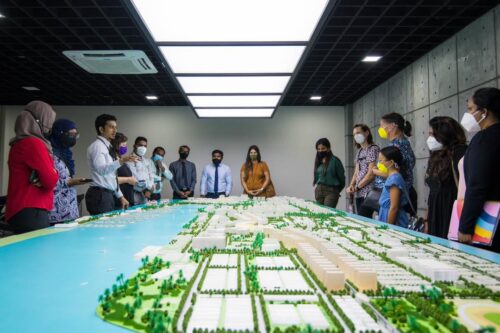USAID’s Clean Cities, Blue Ocean Program Awards its First Grants in the Maldives

Each day, over 750 tons of waste is generated across the Maldives, a nation of more than 1,200 islands. Posing a unique set of solid waste management (SWM) challenges with limited land for waste storage, the country’s dispersed geography requires innovative SWM systems and a circular economy to manage its waste. USAID’s flagship program on ocean plastic pollution, Clean Cities, Blue Ocean (CCBO), is partnering with the Maldives to support national-level efforts to introduce policies supportive of circular economies and advance the country’s efforts to implement EPR (Extended Producer Responsibility) legislation.
CCBO leverages local and international technical expertise, paired with its grants program, to pilot locally relevant, right-sized solutions. CCBO has awarded its first two grants in the Maldives, worth over $300,000, to Small Island Geographic Society (SIGS) and Soneva Namoona to work in the Greater Malé region and Baa Atoll, respectively, over the next two years to implement new, local solutions to address ocean plastics by improving waste management, promoting more sustainable community practices, and reducing the prevalence of single-use plastics. Working in and with communities, local businesses, and local governments, the grantees will identify, test, and scale solutions that promote the 3Rs (reduce, reuse, and recycle) and enhance local waste systems. Learn more about each of CCBO’s grantees, below.
Meet CCBO’s Grantees
Small Island Geographic Society (SIGS)
Project: Sustainability Begins at HOME: Helping Our Marine Environment (HOME)
Location: Greater Malé Region, Maldives
SIGS’ project will engage with residents in the Greater Malé region to research how households are currently using plastics and their knowledge around plastics challenges and potential solutions, such as the Maldives’ single-use plastics phase-out policy. Baseline research will be conducted through surveys with over 250 households in Hulhumale, an area of Metropolitan Male, and a smaller sample of waste audits. With this knowledge, SIGS will partner with 12 households to conduct long-term, innovative action research. Over the course of a year, participants will try out more sustainable practices to reduce and replace single-use plastics. Their journeys will be documented and shared with the broader community through social media to generate awareness and promote wide adoption of community-vetted practices. Using project findings, SIGS will develop and provide guidance to local governments and businesses. SIGS’ approach, which leverages research as a form of community engagement, is novel in the solid waste management sector.
Soneva Namoona
Project: Sustainable Small Islands – Scaling the Namoona 3R/SWM Model to Preserve Islands and Oceans
Location: Baa Atoll, Maldives
The Soneva Foundation will build on its Soneva Namoona program that works with island communities on waste management. In Baa Atoll, Soneva will work with the local Atoll Council to audit current waste management systems and address system gaps—ultimately creating and piloting an island model for waste management that can be replicated across Baa Atoll and other island communities. Elements of the model include: improving collection logistics for plastics, so that it is more consistent and reliable; training women’s development committees in household collection and promotion of 3Rs, so that new jobs and opportunities for income are available to women, while expanding local waste services; and establishing new resources in the community for reuse/recycling—such as compacting stations to receive and bundle plastics for recycling partners and reusable glass bottle stations for households, guest houses, and cafés. Soneva Namoona will also work closely with communities to test household waste segregation, including the separation of organics for composting and island collection, and will coordinate engagement activities, waste collection, and other services that will be implemented during and after the project.

